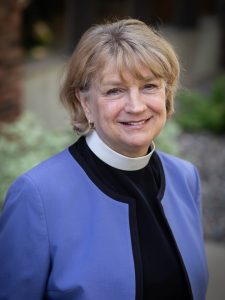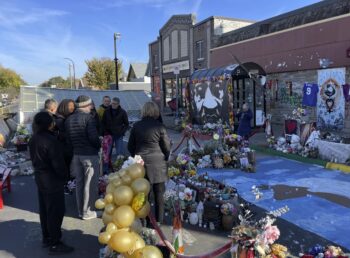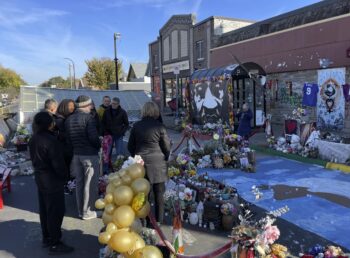 By Bishop Ann Svennungsen
By Bishop Ann Svennungsen
If you ever catch yourself wondering if you should vote in the next election, spend a few days with our Lutheran partners from Leipzig. Last week, several leaders from our synod had that very experience.
We were blessed with the company of five remarkable leaders from the Leipzig District of the Church of Saxony, including its new Superintendent (read “bishop”) Sebastian Feydt. Together, we went to the George Floyd Square Memorial, accompanied by its executive director, Jeanelle Austin. We went to Holy Trinity Lutheran to learn about “permeable church walls” and how the summer of 2020 transformed the congregation. At the synod office, we learned about neighboring practices from Kelly Chatman, director of the Center for Leadership and Neighborhood Engagement (CLNE), and Nick Tangen of the synod staff.

Representatives of the Leipzig District of the Church of Saxony visit the George Floyd Square Memorial
During our conversations our Leipzig friends expressed an almost existential angst about our need to vote – a fundamental cornerstone of democracy.
In all of these places, we experienced a whirl of emotions – sadness, shock, discomfort, gratitude, hope. At the end of our visit, one particular emotion kept churning within me. It was this feeling of urgency whenever we spoke about the upcoming election. During our conversations our Leipzig friends expressed an almost existential angst about our need to vote – a fundamental cornerstone of democracy. They know what it meant to live in a non-democratic state, born and raised in Soviet occupied East Germany. And, they know how easily democracy can crumble – and what kind of sacrifice is required to rebuild it.
In one of our discussions, someone recommended we read Putin’s People. There, I learned how close Vladimir Putin lived to Leipzig – serving as a KGB officer only 63 miles away in Dresden. I also learned that the collapse of the Berlin wall was a turning point in Putin’s life.
IN HIS BOOK, On Tyranny: Twenty Lessons from the Twentieth Century, Timothy Snyder offers 20 key suggestions for all who are concerned about the threats to democracy and want to make a positive difference. And, one of those suggestions is “Learn from peers in other countries.” Others include: be a patriot, defend institutions, practice professional ethics, believe in truth. (The book is a mere 110 pages, so the other 15 are easy to find.)

Leipzig District representatives listen to Jeanelle Austin, executive director of the George Floyd Square Memorial.
As our synod is focused on faith practices and neighboring practices, perhaps Snyder’s book can be one resource for all of us on “democracy practices.” Another resource will be the ELCA’s social statement on civic activity and faith to be completed by the 2025 assembly.
“Perhaps Timothy Snyder’s book can be one resource for all of us on “‘democracy practices.’”
I close with a quote from Snyder’s book that seems to reflect a deep truth in Scripture’s Ten Commandments and Luther’s Catechism: “The U.S. political system was designed to mitigate the consequences of our real imperfections, not to celebrate our imaginary perfection.”
Our vote is a key investment in promoting life and curbing the impact of our real imperfections.
